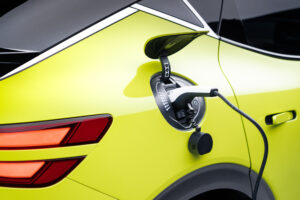Tougher sanctions proposed for vehicle defeat devices
Vehicle manufacturers who fit defeat devices to cheat emissions tests could face criminal prosecution in the UK, under new proposals outlined today (2 February).
These tougher sanctions for manufacturers and suppliers have been outlined in a consultation on measures to improve air quality and road safety, launched by the Department for Transport this morning.

Vehicle emissions testing in a laboratory
Some manufacturers — chief among them Volkswagen — had been found to be using defeat devices, principally in diesel cars, to ensure that vehicles pass the type approval tests by creating a false picture of the emissions of nitrogen oxides coming from the tailpipe.
The devices can recognise when a car is being tested in a lab or is being driven in normal conditions, based on the drive cycle.
In order to pass the testing process, the defeat devices would activate pollution abatement measures when it is being testing in a laboratory but essentially disable these measures when the cars are on the road.
As a result, the government has claimed that there are a significant number of vehicles that have been approved for sale that emit far higher levels of pollution than legal limits allow.
Dieselgate
The so-called ‘Dieselgate’ or ‘VW’ scandal has led to the development of new requirements for real-world testing of new vehicles, which came into effect from September (see airqualitynews.com story).
However, critics have claimed that despite being caught having cheated emissions standards in Europe, car makers have faced a relatively light touch from governments who had little power to punish the companies involved, unlike in the US where executives have faced criminal proceedings.
In its consultation today, the government claims that the VW scandal has, ”shown the need for stringent penalties for manufacturers fitting devices to circumvent the regulatory tests, to provide a sufficient deterrent in the future.”
The government notes that there are penalties for manufacturers committing misconduct during the type approval process, including fines for making false statements and withholding information.
Where manufacturers are required to declare that no defeat device is fitted, a scenario where a defeat device was later found to be present would lead to the application of a fine, for example.
However, government has outlined its intention to go further by creating a civil and/or criminal offence of supplying a vehicle fitted with a defeat device, or other similar functionality, that has the aim of deliberately circumventing type approval regulations.
“This would be irrespective of which national authority is used to obtain type approval. Our intention is to make such an offence applicable to any, and all, elements of the supply chain – the manufacturer, importer or dealer/ distributor. The consumer would not be subject to penalty for purchasing such a vehicle or selling it as a second-hand vehicle,” the government has stated.
Commenting on the consultation, Mike Hawes, chief executive of the Society for Motor Manufacturers & Traders (SMMT), said: “Every new car sold in the UK meets the strictest of regulations governing everything from safety to emissions standards and how vehicles are tested and approved for sale. Government’s own testing of vehicles on the road has consistently shown them to be fully compliant, and we are pleased that government recognises that manufacturers have been rigorous in meeting the standards.
“There are already severe penalties for any manufacturer involved in any kind of misconduct in the type approval process conducted here in the UK and the government is now looking to extend this to all vehicles wherever they have been approved. All new cars meet the toughest emission standards and government now has more powers to conduct in-service testing so consumers can be confident they are buying the cleanest and safest cars in history.”
Safety
The consultation which runs until 2 March seeks views on the proposals, as well as other measures around information on fuel consumption and safety standards.
Further guidance has also been issued to drivers today, warning them of their responsibilities to ensure that their vehicles do not exceed emissions standards through modifications such as removing a catalytic converter or diesel particulate filter.
The guidance states: “The key message is that even if you think you know what you’re doing, if making modifications yourself, there can still be unintended consequences. It is advisable to have any work checked by a competent professional mechanic and ensure you stay safe and within the law.
“Making changes to the engine management, emissions control, exhaust or braking systems carry the highest risk of unintended consequences.”
Related Links
Consultation – Road vehicles: improving air quality and safety
















